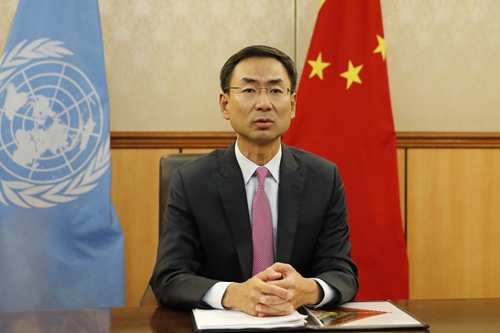Chinese envoy: US should 'look squarely' at the crux of the Korean Peninsula issue
By MINLU ZHANG at the United Nations | chinadaily.com.cn | Updated: 2023-06-03 09:49

The United States should "look squarely" at the crux of the Korean Peninsula issue and take practical and tangible actions to create conditions for peace talks and political settlement, a Chinese envoy to the United Nations said on Friday.
Tension persists on the Korean Peninsula with confrontations escalating, and China finds it deeply concerning, Geng Shuang, China's deputy permanent representative to the UN, said at a Security Council meeting on non-proliferation of the Democratic People's Republic of Korea.
Geng said the Korean Peninsula issue, a legacy of the Cold War that has cast a decades-long shadow, is in essence a security issue.
For decades, the peace mechanism on the Peninsula has been missing, he said. The legitimate security concerns of the DPRK have not been resolved for a long time. The mutual trust between the DPRK and the US has been seriously insufficient, Geng said.
The Korean Peninsula issue had reached an inflection point several times in the past. However, because of the flip-flop in the US policy, its failure to respond on the principle of action for action, and its reversion to the old practice of sanctions and pressurization, the opportunities to solve the Korean Peninsula issue were missed time and again, Geng said.
In recent years, the US has incorporated the peninsula into its so-called Indo-Pacific Strategy, continued to carry out military activities on the peninsula and surrounding areas, and greatly increased its military presence, Geng said, adding it "seriously damaged the strategic security interests of the peninsula and surrounding countries."
The US and the Republic of Korea in April issued the "Washington Declaration", stating that they would strengthen "extended deterrence" and the US planned to send strategic nuclear submarines to the peninsula, Geng said.
"The US has ignored the concerns of other countries," he said. Geng said the US "fully served its own geopolitical interests, and insisted on making use of the peninsula issue to create tension."
"The US approach is full of Cold War mentality, instigates confrontation, and harms the strategic security interests of other countries. It runs counter to the goal of maintaining peace and stability on the peninsula and promoting the denuclearization of the peninsula," Geng said.
Under the current circumstances, all parties should remain calm, exercise restraint, and avoid any action that could escalate tensions and lead to miscalculation, the envoy said.
It is hoped that relevant sides can strive for a political settlement and address each other's legitimate concerns in a balanced way through meaningful dialogue, Geng added.
The UN Security Council should play a constructive role to the status of the Peninsula, Geng said.
Blindly blaming a certain party and pushing all the responsibilities to a certain part will only intensify contradictions and inject new uncertainties into the already tense situation on the Peninsula, he said, adding that the Security Council should make active efforts to ease sanctions in due course.
While the US demands the denuclearization of the peninsula under the banner of non-proliferation, it has upgraded its "nuclear umbrella" externally, cooperated with other countries on nuclear submarines, and transferred tons of weapons-grade enrichment uranium to non-nuclear-weapon countries, Geng said.
"This is a typical double standard. Relevant cooperation undermines the international nuclear non-proliferation system, stimulates an arms race, endangers regional peace and security, and has a serious negative impact on the denuclearization process on the peninsula," Geng said. "It should be stopped," he said.
US President Joe Biden and the Republic Korean President Yoon Suk-yeol in April signed an agreement that includes plans to have US nuclear-armed submarines dock in the Republic of Korea for the first time in more than 40 years, media reported.
On Wednesday, the military reconnaissance satellite launch that conducted by the DPRK suffered an incident, with the carrier rocket falling into the waters of the western region, according to Korean Central News Agency, the state news agency of the DPRK.
minluzhang@chinadailyusa.com























